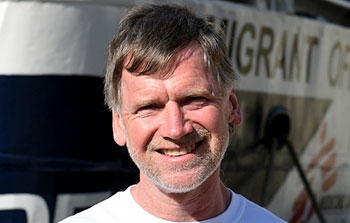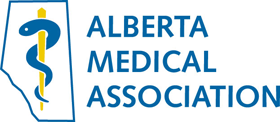Hope floats

Alberta physician, Dr. Simon Bryant spent months at sea tending to refugees fleeing conflict, as part of Doctors Without Borders’ first ship-based medical mission.
We certainly saw Syrian refugees, but there were also people fleeing from Boko Haram in Nigeria and many people from Eritrea, who were fleeing compulsory military conscription that often turns into life-long slave labor.
Dr. Simon Bryant is no stranger to working in varied locales. The Canmore-based emergency physician has spent much of his medical career working in rural communities as part of the AMA’s Rural Locum Program. His dedication to caring for the disadvantaged has also taken him on missions with Medical Mercy Canada and to the Thai-Burma border. But little could have prepared him for his experience on Doctors Without Borders’ (also known as Médicins Sans Frontières - MSF) first ship-based medical mission in the Mediterranean Sea.
“It was astounding,” he recalls over the phone from Cambridge Bay, Nunavut, while on a two-week locum. “I was there for seven months, from April to October 2015. We did major re-supplies in Malta every month, but otherwise we lived on the ship full time.” He notes that it was the first time MSF had launched a medical mission at sea, “but there was this increasing flow of people fleeing to Europe by sea and at that point there was really nothing else in terms of search and rescue resources.”
Although the world’s attention was focused largely on the thousands of Syrian refugees who were fleeing the war in their home country, the refugees rescued by the MSF sea medical mission came from various parts of the world.
“We certainly saw Syrian refugees, but there were also people fleeing from Boko Haram in Nigeria and many people from Eritrea, who were fleeing compulsory military conscription that often turns into life-long slave labor.”
Dr. Bryant explains that many refugees were unprepared for how arduous the journey would be. “People often didn’t realize what they were getting into and that the journey itself would be so dangerous. I’m sure some of them looked at the boats they were climbing into in horror, but at that point they had absolutely no other choice. For them the only way out was forward.”
As part of the MSF team, Dr. Bryant helped treat almost 7000 refugees who were rescued from over-crowded boats and flimsy rafts. Of that number, more than 100 were children under the age of five. In addition to providing emergency medical care and transport, Dr. Bryant and his colleagues also helped to get the message out to the rest of the world about the plight of the refugees and the need for more help.
“We did a lot of media interviews because we wanted people to know that there are currently 60 million refugee and displaced people on the planet; as many as there were at the end of the Second World War. And we have a collective responsibility to address the causes and consequences."
“I returned feeling very privileged to enjoy the security we do here in Canada.” It was also a transformative experience for how he interacts with others. “I’m definitely more aware of people now and find I’m a little more polite in traffic and that I tend to hold doors open a little longer for people now.”
It’s an experience he would be happy to undertake again. “This is such important work and it was an incredible team effort, both with the MSF team I worked with on the ship and my colleagues here who helped me to take the time away.”
Cognizant of the commitment of time and effort required by volunteer work, Dr. Bryant still encourages other physicians to consider getting involved, either here at home, or abroad.
“It’s an opportunity to have a positive impact on our world and you get back so much more than you put in.”
